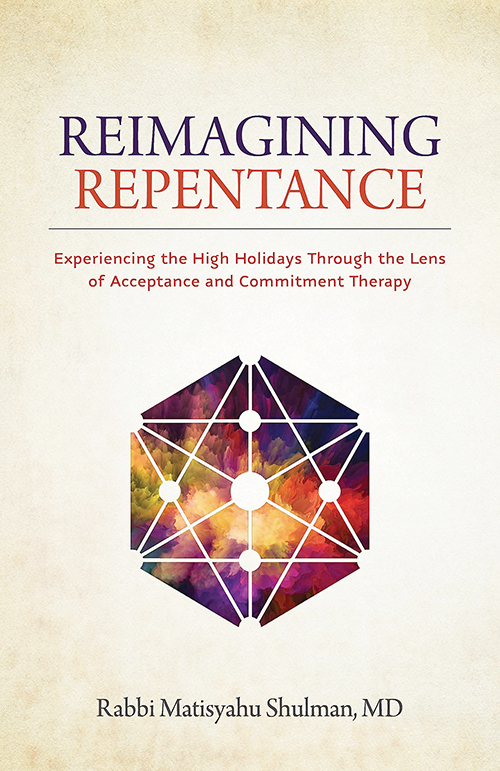
Highlighting: “Reimagining Repentance: Bringing ACT Therapy Into the High Holidays” by Rabbi Matisyahu Shulman, MD.
Kodesh Press. 2023. English. Paperback. 184 pages. ISBN: 13979-8888940174.
Dr. Matisyahu Shulman didn’t plan on becoming a doctor. In fact, the Teaneck native, who had earned semichah from YU before he ever applied to medical school, had always envisioned himself as a pulpit rabbi, sharing his love of Gemara with others and building a vibrant community.
But, as the saying goes, “Man plans; God laughs,” and clearly Hashem had other plans for Shulman. His internship during semichah was at a local Hillel house, and he found that many of the young people he met were really in need of mental health support as much as spiritual guidance. The observation contributed to his decision to attend medical school to become a psychiatrist. Today, Shulman works at Columbia University as a researcher specializing in addiction, as the medical director of the Lakewood Community Service Corporation or LCSC, and in a clinical practice in Teaneck.
Besides his clinical and research work, Shulman has remained true to his original hopes to share Torah with the community and last month released his first book, “Reimagining Repentance: Bringing ACT Therapy Into the High Holidays,” which offers a refreshing perspective on how to approach the Yamim Noraim, combining the world of the rabbinate with modern psychology.
ACT stands for acceptance and commitment therapy and is defined by WebMD as a “type of mindful psychotherapy that helps you stay focused on the present moment and accept thoughts and feelings without judgment.” Some call ACT the third wave of cognitive behavioral therapy (CBT), but for Shulman, what matters is that ACT fits very well into many Torah ideas.
“Psychology has been working on understanding how best to help people who are suffering from mental illness for a long time, and this newest approach, ACT, looks a lot like ideas that we find in the Torah,” the author said. “This book is really showing how we can connect the language of psychology with those ideas. If we do that, then we can think very differently about the Yamim Noraim.”
Growing up in Teaneck, Shulman always heard about the idea of trying to make a Torah life relevant and meaningful to someone growing up in modern orthodoxy. “I wrote the book to help people because in my own struggle, I think there were times when I had trouble connecting the Torah life that we had been taught, with growing up in a modern society. It’s really about making things relevant and keeping things healthy.”
The book was a long time in the making. For many years, when Dr. Shulman was still going by Rabbi Shulman, his father would host a minyan for Rosh Hashanah and Yom Kippur and Shulman would sometimes be called upon to give the speeches. He was studying psychiatry and noticed the overlap between the change that we are trying to create in therapy and the change that we are trying to create during the High Holidays. Of course, this overlap helped spark some interesting speeches. These eventually developed into essays that became the chapters of the book.
Shulman said there are those who believe there are irreconcilable differences between modern psychology and religion. “But there has always been a group that connected the two, starting from at least the Rambam. For centuries Jewish thinking has been taking ideas from philosophers like Aristotle to William James (who many consider to be the father of American psychology) on how to change oneself and one’s character traits. Viktor Frankl, the founder of Logotherapy, believed that living a life of meaning and being psychologically healthy go hand-in-hand.”
There are many people who would argue that in order to have a true relationship with Hashem, you need to be psychologically healthy. While that may seem like a lofty goal, Shulman said that working on being psychologically healthy plays an inherent role in our religious journey. “I think the more we work on that, the deeper of a relationship we can have with God.”
Another important side of the interface between psychology and Torah is how we interact with others, especially those who do not fit into our communal norms. In “Reimagining Repentance,” Shulman discusses how during Kol Nidre we recite the words “We hold it lawful to pray with sinners.” He uses that concept to illustrate the importance of connecting to the people we usually don’t invite into our community. He explains that individuals suffering from addiction face the most severe stigma and often don’t really fit in with our community.
As an expert on addiction, Shulman helped start the support group for CCSA, Communities Confronting Substance Use and Addiction, the organization founded by Lianne and Etiel Forman. Based on that experience, he argues that our community needs to be mindful about how we treat those who don’t fit into our norms, and their families. “I’m certainly trying to help people to feel more connected with those that don’t fit in,” he said. There are situations, he explained, that involve difficult decisions about whether to allow a child to remain in the home or try to work with them and keep them safe even though they are not doing exactly what you want. He hopes that his next book will make these ideas not simply a single chapter, but the focus of the entire work.
“Sometimes, striking the right balance can save someone’s life. Teaching people to be more accepting of others in that way can make a huge difference in how we address these problems.”
To order “Reimagining Repentance: Bringing ACT Therapy Into the High Holidays” by Dr. Matisyahu Shulman, visit the Kodesh press website (https://kodeshpress.com) or your local Jewish bookstore.








